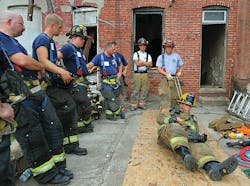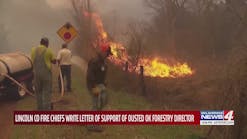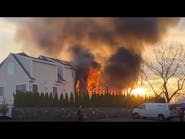As a career fire officer and as a fire academy instructor, I have on occasion encountered frustrated fire officers. Company officers who were faced with the constant uphill battle of trying to conduct company level training.
The most serious issues that I have noticed fall into four separate areas of concern. As a company officer have you ever encountered any of the following issues?
- Trying to motivate your troops when they don’t want to be motivated.
They’ll tell you point blank that they’re not interested in the “job.” They’re there because of the salary and benefits or the social aspects. Any training that these troops are ordered or “forced” to sit through might seem to you as a waste of both your time and theirs.
- You have high maintenance people that will complain to such an extent that you might think it’s easier to just leave them alone and concentrate on training those who have easier-going personalities.
Personnel who vociferously complain about everything, whether it’s training or building familiarization or checking their equipment or even having to respond to a call can bring down the moral of the company officer dramatically. Your high maintenance people always do as they’re ordered, but it’s a constant uphill battle to get these people to conduct even the simplest of tasks!
- You may find those who are slightly more willing, but their attention span is very short, or worse, they just “talk the talk.”
The troops with the short attention spans are easily distracted by their cell phone or become consumed with reading a nearby newspaper or are too busy wanting to have something to eat or having a conversation of a different nature with their nearest colleague. Those who “talk the talk” portray themselves as hard chargers, but unfortunately rarely produce that hard charge that is the spirit of a “heavy hitting” company.
- Or, the worst of the scenarios; you are trying to educate your people only to be told either verbally or through their actions that they don’t want to be educated in this field.
In this worst-case scenario, you find the members taking a back seat, or choosing not to actively participate, or for one reason or another, they “disappear.” Also, such attitudes as “Captain so-and-so is out sick today … great, no training!” are in line with this area of concern. These situations are deplorable, but gratefully are rare.
For good or bad, this type of behavior illuminates the group’s actions and thought process like a bright light that all in the organization from the top to the bottom will notice. These circumstances are problematic. As a company officer, you cannot “order” someone to be interested in this field of study.
Most departments and most company officers don’t have to contend with these issues. These company-related issues that I’m speaking of are some of the worst of the “worst-case” situations. This article is geared towards those rare situations where the culture of the department, or the culture of the company, or the specific shift of a company has allowed such behavior to occur. Trying to change this overnight becomes quite a task for the newly assigned, transferred, or promoted company officer.
Management and leadership gurus have the answer, I’m certain, but what about those absolute worst-case scenarios where all of the inspirational talks and all of the effective leadership strategies fall on deaf ears? Rare situations where even the leadership experts would shake their heads!
The fire service is people! They are the greatest strength, but can also be the weak link in the chain in some cases. This article is geared towards these scenarios. There is no quick fix to people-related issues, no instant medicine to remedy the above problems, no quick answers from the book. Nevertheless there has to be something the company officer can do?
What I want to do is to share some thoughts with those company officers who are faced with the most frustrating of circumstances and lay out a road map towards maintaining their sanity, improving their career in the process, and still contributing to the overall success and safety of the department. Basically, we’ll look at what the company officer can do to protect his people and then explore possible solutions to bringing the team up to a high level of proficiency.
Possible Reasons For The Company Officer’s Headaches
A company officer comes along, either through new promotion, transfer, or recent appointment and encounters any one or combination of the points discussed earlier. For our purposes, we will gear this article to fire officers who are consumed and immersed in the job. They have experience and charisma, are sought after for what they bring to the table, and are truly interested in sharing through training the technical aspects of the job. Yet, by the hand of fate, the new assignment is a disaster where all of the empathetic leadership and motivational strategies fail no matter what. Training at the company level becomes a constant struggle. Why?
The answers are complex, but what I have found is it could broadly fall into two major categories:
- The first is the culture of the department, the company, or even a specific shift. What do we mean by the culture?
All of our organizations have a history, and the history of the fire service is a proud one no doubt. But we are not perfect! There are always issues that need to be addressed through forums such as this. It’s the only way we can learn and improve and evolve into even better organizations!
Some departments, companies, or shifts have a culture of great discipline, volunteer or career. Members accept this culture and assimilate into this group, otherwise peer pressure forces those malcontents out or forces them to conform.
But sometimes organizations have problems because they’re too “tight knit.” Its members may have known each other all or most of their lives. Having a tight bond with your colleagues is great and enhances unit effectiveness, but what if the team is primarily socially motivated and their fireground performance and ability is based on all talk?
In other words, tight knit to the point where it negatively affects the success of the mission. Members feel free to run wild knowing that disciplinary actions will never be used to control their behavior. This can be one of the problems of small departments where people have known each other forever. In addition, a tight-knit unit that always looks back to past successes and rests on their laurels doesn’t prepare successfully for future combat! Talking the talk is always second to being able to walk the walk!
New members see this behavior and attitude that permeates, accept it as the way of the organization, and the cycle continues to spiral out of control. An organizational culture where fire officers or members are never held accountable, where they can act as they choose, and where the group experiences a never-ending cycle of mediocrity are the symptoms of a future tragedy!
- The second problem is how we choose our people; are they the best of the best?
Strongly related to organizational culture is the hiring (yes, for volunteer organizations as well) or the promotion process of firefighters and fire officers. To limit the problems in an organization, we have to have the best and brightest talent that is available to us! For fire officers, the best and brightest are those with knowledge, experience, charisma, the ability to be articulate, a successful track record in fireground operations, and past successes in helping their colleagues improve and evolve into better firefighters and officers. This is also applicable to our volunteer organizations as well.
Difficult entrance requirements and promotional processes, mentally and physically challenging training programs, and very challenging testing programs (both academic and physical) allow the “cream of the crop” to rise to the top. Organizations that strive for mediocrity will inevitably have problems.
These two principles, organizational culture and personnel quality, are directly related. They apply to all career and volunteer fire departments.
If you strive to seek out the highest caliber of people all the time, then the culture of the group will improve. It will be a constantly expanding circle of growth and the organization will know no limits towards its’ overall success.
Today, most of our organizations are at the middle to upper end of the training spectrum, but what about the very few company officers who face stress and aggravation on a daily basis when it comes to maintaining their units at peak efficiency? What is the cure? Sure, a culture of having the best and brightest people permeate the organization at all levels is the ultimate answer, but what does the company officer do now when the problems discussed above, exist?
In Part 2 of this series, we will start to explore some ideas and solutions for the company officer and how he or she can enhance the safety of their company and improve their own career prospects.
ARMAND F. GUZZI JR. has been a member of the fire service since 1987. He recently retired as a career fire lieutenant with the City of Long Branch, NJ, Fire Department and is the deputy director of the Monmouth County, NJ, Fire Academy where he has taught for over 20 years. He has a masters degree in management and undergraduate degrees in fire science, education, and business administration. View all of Armand's articles here. He can be reached via e-mail at [email protected] or [email protected].






